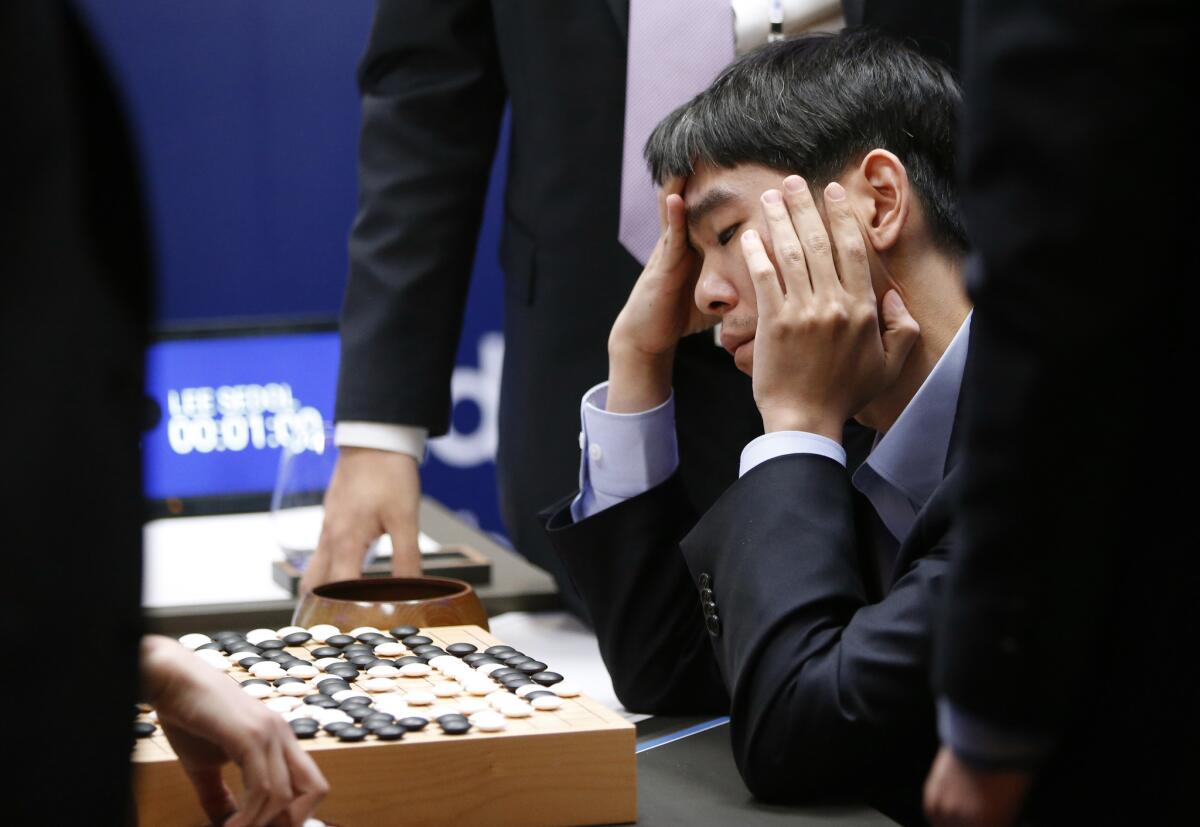Computer program emerges victorious in five-game match against Go champion

South Korean Lee Sedol, the world’s top-ranked Go player, was defeated by Google’s AlphaGo computer program in a final match on Tuesday that sealed its 4-1 victory.
- Share via
Reporting from Seoul — A computer program ended its five-game match against the world’s top-ranked Go player with another win Tuesday, sealing a landmark achievement for artificial intelligence.
The intricate game of skill had long stumped computers. The match was “the most mind-blowing game experience we’ve had so far,” Demis Hassabis, cofounder of Google DeepMind, the makers of the AlphaGo program, said at a postgame news conference.
Tuesday’s contest was the closest of the five games played over the past week, the only one decided by counting points, rather than ending in resignation by AlphaGo or opponent Go grandmaster Lee Sedol.
Lee and AlphaGo played five games in seven days, starting on March 9. AlphaGo won the first three games handily; Lee turned the tide and scored his only win on Sunday.
In Tuesday’s game, AlphaGo made an early error, which Lee attempted to capitalize on, but ultimately the Google program fought back and gained control.
Immediately after the game, Lee looked sad and exhausted, wiping tears from his eyes before leaving his seat for the final time. He was apologetic after the game, saying, “I regret that I wasn’t able to achieve a winning result today.”
See more of our top stories on Facebook >>
“I will practice harder to prove that I can do better,” he told the room of applauding journalists and spectators.
Throughout the week of competition, Lee’s performances have been closely watched in his native South Korea and abroad, both by Go enthusiasts and observers who saw him as representing humankind in the battle of man versus machine. He shouldered all responsibility for having come up short, saying, “This loss is a loss for Lee Sedol, not for humankind.”
The match was held to determine if AlphaGo could become the first program to beat a top-ranked player of Go, a complex and intuitive game. DeepMind designed AlphaGo with deep neural networks and a tree search function, then trained the program to recognize the most advantageous Go moves by exposing it to thousands of games and playing against itself.
Hassabis mentioned that in more than one instance over this week’s match, Lee made moves that AlphaGo struggled to respond to, and that those shortcomings would be analyzed for insight into how to improve the program.
“AlphaGo demonstrated this week that it is not only a machine that thinks, but one that can learn and strategize,” said Howard Yu, professor of strategic management and innovation at the International School of Management and Development in Switzerland.
“In this regard, it is the most momentous milestone in the field of AI [artificial intelligence] since Deep Blue,” Yu added, referring to an IBM program that beat chess grandmaster Garry Kasparov in 1997, the first ever to win a match against a top player.
But Deep Blue was built solely for the purpose of playing chess, and was dismantled after its victory.
DeepMind’s designers hope that their program’s historic victory heralds the beginning of its life, not the end, and that the software’s power can now be directed toward more practical uses.
Hassabis said that AlphaGo “can be used to address all sorts of real world problems.” But while he pointed to robotics, healthcare and smartphone technology as areas of interest, Hassabis declined to offer specifics on how DeepMind would look to apply AlphaGo in the future. “We’re still in the early days of development,” he said. “But we believe we have a powerful tool that will help human experts achieve more.”
Borowiec is a special correspondent.
ALSO
AlphaGo beats human Go champ in milestone for artificial intelligence
How a human Go champion finally beat Google’s artificial intelligence machine
Big debt by some wealthy borrowers in India sparks outcry, especially when the good times roll
More to Read
Sign up for Essential California
The most important California stories and recommendations in your inbox every morning.
You may occasionally receive promotional content from the Los Angeles Times.













